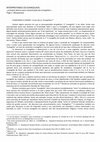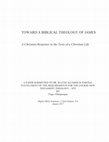Papers by Tiago Albuquerque

The belief on knowability, clarity and perspicuity of the Scripture costed the lives of many brot... more The belief on knowability, clarity and perspicuity of the Scripture costed the lives of many brothers not many centuries ago. Wycliffe, William Tyndale, João Ferreira de Almeida, Martin Luther and many Reformers were known for their high view of Scripture and the unmovable desire to put the Scripture in the hands of folks in their native language. They were completely convinced that the reading of the Bible by the people could bring an immense benefit and would be much more profitable in comparison to the teaching from the Roman Catholic Church. They believed that everyone could comprehend and apprehend the treasures of the Scripture, because its meaning was accessible and clear for everybody. With these doctrines in their minds and hearts, they faced severe persecution and gave their lives to translate the Word of God into different languages. For all of them the Scripture “ist klar, eindeutig, unverschlüsselt und jedermann zugänglich. Seine Evidenz ist schlagend.”
The triumphalist influence of Neo-Pentecostalism has reached more supporters in contemporary Braz... more The triumphalist influence of Neo-Pentecostalism has reached more supporters in contemporary Brazilian society. Musical groups who espouse these ideas have great influence on the younger generation. So many of these, without any discernment, relay their content as God's truth.
We intend, therefore, to stress the significance of blessing (prosperity) in the Pentateuch, specifically in Deuteronomy 28, and oppose its modern application by embracing the Theology of Prosperity. We will describe how the blessing was understood, promised, received, used, for what purpose it was given, under what circumstances it would appear and for what reasons God blessed. We will also examine the biblical conditions for obtaining it. If there is an absolute continuity to these promises will be determined.

O Background de Prima Petri como chave para a interpretação do Descensus; o que Agostinho não viu... more O Background de Prima Petri como chave para a interpretação do Descensus; o que Agostinho não viu. Tiago C. Albuquerque INTRODUÇÃO Este artigo analisa a doutrina da descida de Cristo ao inferno e a aplicação do texto de I Pedro 3.18,19 como seu motif. Depois de um breve apanhado histórico no pensamento teológico do dogma da descida de Cristo ao inferno (latim. Descensus ad inferos), a análise será focalizada na perspectiva do bispo Aurelius Augustine (IV d.C.), que sobre muitos aspectos inovou a interpretação desse dogma, aplicando de maneira firme e sistemática, pela primeira vez, o texto de I Pedro 3:18,19 para sustentá-lo, diferente do uso de Clemente de Roma (II d.C.) e sua interpretação helenista do Hades. Feita a descrição histórica da exegese agostiniana desse texto e doutrina, o autor sugerirá uma exegese a favor da ida de Cristo já ressuscitado ao inferno declarar Sua vitória e condenação dos espíritos que foram feitos prisioneiros na época de Noé, isto é, anjos caídos, e argumentará a favor dessa leitura como sendo a que melhor serve ao argumento de Pedro dentro de sua Primeira Carta, bem como do contexto imediato em 3.13-4.6, apreciando, então, com ressalvas exegéticas, a validade da interpretação agostiniana, e daí refletirá sobre as implicações dessa doutrina, como o Bispo de Hipona disse: "quem, portanto, exceto o infiel, negará que Cristo esteve no inferno?" 1

-princípios básicos para interpretação dos Evangelhos -Tiago C. Albuquerque PLANEJANDO A VIAGEM -... more -princípios básicos para interpretação dos Evangelhos -Tiago C. Albuquerque PLANEJANDO A VIAGEM -O que são os "evangelhos?" Existem alguns assuntos em que as pressuposições atrapalham. O "evangelho" é um deles. Existe uma pressuposição quase que absoluta na Cristandade sobre o que é o Evangelho, até que alguém ouse exigir uma definição mais precisa. Uma tempestade mental se inicia e é difícil encontrar duas respostas absolutamente iguais. Alguns podem automaticamente pensar nas "4 leis espirituais," no "mapa romano para o Céu", ou simplesmente na mensagem de salvação. Talvez alguns pensem na "morte de Cristo pelos pecados" ou na história de Jesus. Quem conhecer o grego pode providenciar uma definição etimológica mais consistente e afirmar que evangelho é a "boa nova". Outros podem pensar que isso depende se é "o evangelho de acordo com Mateus, Marcos, Lucas, João", ou até mesmo "Paulo e Pedro".
Drafts by Tiago Albuquerque
What is the goal of John's prologue?

6 is moved to write informally some weighty words of counsel to them." 15 Also, he is certainly r... more 6 is moved to write informally some weighty words of counsel to them." 15 Also, he is certainly right in stating that "one of the most clearly marked features of the Epistle certainly is the stress which James lays on the absolute necessity of cultivating the Christian graces, of cultivating practical godliness." 16 Richard Bauckham is convinced that, although James cannot be accused of incoherence, the disposition of his letter's content does follow the common and expected fluency, and it seems hardly "arranged in entirely random order, [but] if this were the case, it would not necessarily impede James' overall goal in his work." 17 Recently, William Varner proposes "By applying the techniques of cohesion, prominence, peak, and grouping to the text of James … that James 3.13-18 is the peak of his discourse." 18 Varner arrives at that conclusion because in this particular passage "general dissimilarity from the co-text; rhetorical underlining; concentration of participants; heightened vividness; change of pace; and change of vantage point" 19 indicate that this is the peak of James's argumentation. He is admittedly following others before him such as Herman Cladder, 20 James M. Reese, 21 and, particularly, Patrick Hartin who argues that every other periscope of James orbits or is "forming and embracing around [James 3.13-18]." 22 James 3.13-18 does not seem to encapsulates the totality of James' argumentation. Despite the themes of "wisdom" and "two ways," which can be taken as James's clear emphasis throughout his letter, other obvious 15
A introductory appraisal of Schnelle's NTT; uma avaliação introdutória da Teologia do NT de Udo S... more A introductory appraisal of Schnelle's NTT; uma avaliação introdutória da Teologia do NT de Udo Schnelle.
Book Reviews by Tiago Albuquerque
Validade a autoridade do Antigo Testamento como Literatura Cristã.
Apresenta as questões mais fundamentais envolvidos na Teologia Bíblica do Antigo Testamento.
Resenha desse livro que é o melhor na função de explicar a história da Teologia Bíblica.
Uploads
Papers by Tiago Albuquerque
We intend, therefore, to stress the significance of blessing (prosperity) in the Pentateuch, specifically in Deuteronomy 28, and oppose its modern application by embracing the Theology of Prosperity. We will describe how the blessing was understood, promised, received, used, for what purpose it was given, under what circumstances it would appear and for what reasons God blessed. We will also examine the biblical conditions for obtaining it. If there is an absolute continuity to these promises will be determined.
Drafts by Tiago Albuquerque
Book Reviews by Tiago Albuquerque
We intend, therefore, to stress the significance of blessing (prosperity) in the Pentateuch, specifically in Deuteronomy 28, and oppose its modern application by embracing the Theology of Prosperity. We will describe how the blessing was understood, promised, received, used, for what purpose it was given, under what circumstances it would appear and for what reasons God blessed. We will also examine the biblical conditions for obtaining it. If there is an absolute continuity to these promises will be determined.